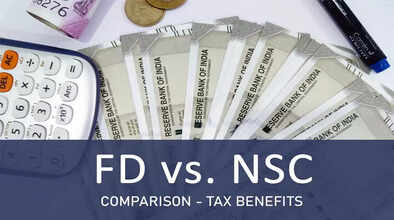Post Office's two superhit schemes: Which one is best for you between FD and NSC..

Whenever it comes to safe investment, the name of the post office definitely comes up. The schemes here are guaranteed by the government, so there is no risk of money sinking. For this reason, post office time deposit (FD) and National Savings Certificate (NSC) have always been the preferred option, especially for people looking for fixed income and guaranteed returns. But which option is better for you depends on your different needs. Here, understand every aspect of both schemes carefully and then decide which scheme can prove to be better for you.
What is a Post Office Time Deposit (FD/TD)?
This is exactly like a bank's fixed deposit (FD). You deposit a lump sum amount for a fixed period, and you get a fixed interest rate on it. In the post office, it is called a time deposit (TD). In this, you can invest money for 1, 2, 3, and 5 years.
What is a National Savings Certificate (NSC)?
This is also a small savings scheme of the post office, but its main purpose is to save tax along with investment. It is issued in the form of a certificate, and its duration is 5 years.
Post Office FD Vs NSC
1. Interest Rate
The government fixes the interest rates of both schemes every three months.
Post Office TD (July-September 2025):
1 year: 6.9%
2 years: 7.0%
3 years: 7.1%
5 years: 7.5%
NSC (July-September 2025): 7.7%
NSC is slightly better in terms of interest rate.
2. Tax Benefits - (This is the biggest difference)
There is a huge difference between the two schemes in terms of tax.
Post Office TD
Only the money deposited in a 5-year TD is eligible for a deduction of up to Rs 1.5 lakh under Section 80C of the Income Tax Act. There is no tax exemption on 1, 2, or 3-year TD. The interest earned on TD is fully taxable and is added to your annual income.
NSC
On investment: You get a tax exemption under Section 80C on an amount of up to Rs 1.5 lakh deposited in NSC.
On interest (this is where the real game is)
You do not get the interest on NSC every year; rather, it gets reinvested in the principal. You also get a tax exemption on this reinvested interest under Section 80C (within the total limit of Rs 1.5 lakh). Only the interest of the last, i.e., 5th year, is taxable.
3. Tenure / Lock-in Period
Post Office TD: In this, you get options of 1, 2, 3, and 5 years. It is more flexible.
NSC: It comes with a lock-in period of only 5 years.
If you have to invest money for a short period, then Post Office TD is better.
4. How is the interest received (Interest Payout)
Post Office TD: In this, the interest is calculated quarterly, but it is paid annually. If you want, you can take this interest in your post office savings account.
NSC: In this, the interest is compounded annually, but it is paid along with the principal on maturity.
If you want a small income in the form of annual interest, then TD is better. If you want to see the money grow, then NSC is good.
5. Premature Withdrawal
Post Office TD: You can withdraw it after 6 months, but a penalty is levied.
NSC: It cannot be withdrawn before 5 years, generally. It is allowed only in special circumstances, such as the death of the investor or a court order.
TD is slightly better in terms of liquidity, but a penalty is levied.
Which is better for you?
You should choose NSC if:
Your main objective is to save tax.
You are willing to lock your money for 5 years.
You do not need a regular income in between.
You want to keep the option of taking a loan against it in the future open.
You should choose Post Office TD if:
You want to invest money for a short period, like 1, 2, or 3 years.
You are taking a 5-year TD to save tax, but you need a little more liquidity than NSC.
You want annual interest on your investment.
Disclaimer: This content has been sourced and edited from Zee Business. While we have made modifications for clarity and presentation, the original content belongs to its respective authors and website. We do not claim ownership of the content.

